
- Mountain Biking - Home
- Mountain Biking - Overview
- Mountain Biking - Types of Bikes
- Mountain Biking - Equipment
- Mountain Biking - Trails
- Cross Country Biking
- Mountain Biking - Downhill Biking
- Mountain Biking - Dirt Jumping
- Mountain Biking - Free Riding
- Mountain Biking - Trail Riding
- Mountain Biking - Rules
- Mountain Biking - Champions
Mountain Biking - Quick Guide
Mountain Biking - Overview
Mountain biking is a sport in which the participants ride a bike off road. The terrain can be desert, mountain, rocks, and many others. There are many categories of this sport like downhill, cross country, dirt jumping, etc. The riders shall carry equipment to repair their broken bikes. Along with it, they should carry backpack having useful things because they racing is far from the civilization.
In this racing sport, the rider performs moderate to high level of technical riding on off- road locations and compete with other riders while maintaining balance on the bike. Depending on the variant, the bike riders have to reach the finishing line as fast as possible. The first three riders to finish the race after finishing the required laps are declared winners.
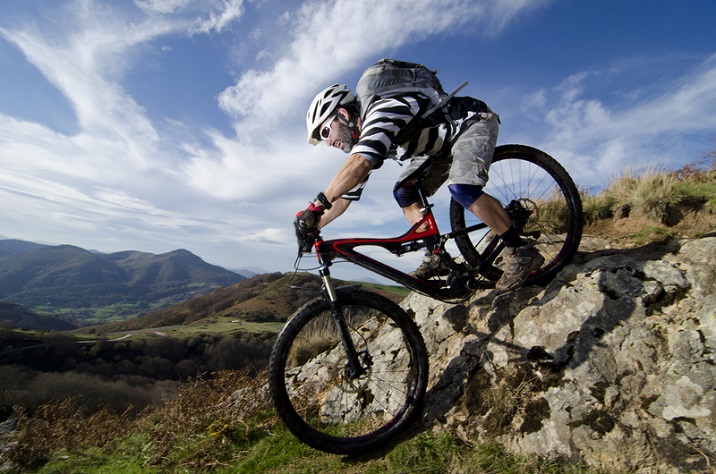
A Brief History of Mountain Biking
Mountain biking was first originated at California in the 1970s as a fringe sport. Velo Club Mount Tamalpais, California first established mountain biking as a sport and during 1976 to 1979, they started organizing Downhill Mountain biking races regularly, which drew the attention of public as well as media.
The first National Mountain Biking Championship was held in USA in the year 1983 and the sport soon started gaining popularity in other countries mostly in Europe and Australia.
Around 1970s and early 1980s, companies started building mountain bicycles exclusively for this sport using lightweight materials. The first mountain biking championship that was recognized by International cycling union was held in 1990.
For the first time in Atlanta Games, mountain biking was included in Olympics with a cross country event for both main and women. Slowly mountain biking gained the reputation of a mainstream activity around the mid-21st century and more number of mountain bike oriented resorts started opening all around the world.
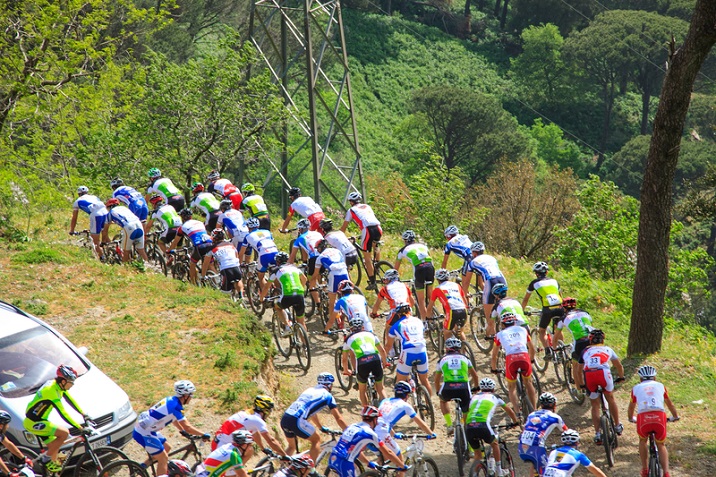
Participating Countries
The popularity of mountain biking is increasing rapidly day by day which is quite evident from the rising number of participations in mountain biking events worldwide. As of 2015, 130 countries have registered for UCIs mountain biking events for the year 2015 which is again the second highest number after 2012 where total 132 countries participated in worldwide biking events.
The countries where Mountain Biking is immensely popular include: France, Australia, USA, Switzerland, New Zealand, Czech Republic, Germany, Canada, United Kingdom, Japan, and Australia.
Mountain Biking - Types of Bikes
These bikes are specially designed for the use in mountain biking. The special features provide improved durability as well as performance in rough terrains. The tires used in these bikes have a predefined track and are mounted on rims that are far stronger than non-mountain bike rims.
Suspensions − All modern mountain bikes have suspensions, tires with diameters 26 inch, 27.5 inch or 29 inch and 1.7 to 2.5 inch width and a rising and flat handlebar which gives the rider more control over the bike.
Brakes − Mountain bikes also use hydraulic disk brakes which are more powerful than normal brakes. They also have low ratio gears which help the bikers passing steep hills as well as obstacles. As compared to normal bikes, mountain bikes have smaller rims.
Pedals − The kind of pedal used in this kind of bikes are also different from normal bikes where the pedals are designed for the special kind of shoes that are used by the bikers in mountain biking and those shoes really fit in those pedals which provide an amazing biking experience.
Based on the use of suspension, there are four types of bikes −
Rigid − A frame with rigid form and no suspension.
Hard tail − A frame with front suspension fork but no rear suspension.
Soft tail − A frame with some amount of rear suspension.
Dual or full Suspension − A frame with both front and rear suspensions
Based on the types of mountain biking and the type of terrains, different kinds of bikes are designed.
Cross-Country Bikes
Cross-country mountain bikes are primarily made for cross country racing. In case of cross country, the biker needs to climb more and more speed and endurance is also required because of which the bikes made for this kind of biking are lightweight and quite efficient.
In early days, hard tail bikes were used in cross-country bikes, but nowadays, full suspension bikes with lightweight aluminium frames are been used.
Trail Bikes
Trail bikes are very much similar to that of cross country bikes which are built exclusively for bikers mostly riding at Trail centres. They also have around 11 to 15 kg weight with geometries slightly slacker than cross country bikes. They usually are built to handle rougher terrains than cross country bikes.
Enduro / All Mountain Bikes
All mountain bikes are a combination of cross country as well as free ride bikes. With weight between 13 kg to 16 kg, they feature travels with great suspension level of 6 to 7 inch and are designed to climb as well as descend well.
Downhill Bikes
Downhill bikes have more suspension level than AM bikes, i.e. around eight or more inches of suspension at both front and rear travel and are made of strong but lightweight materials like carbon fibre and with weight mostly below 18kg.
With typically high gears and slack geometry angles, they are mostly made for downhill biking as well as racings. Because of their high speed nature, they mostly have one chain ring with a large bash guard and a chain guide.
Free Ride Bikes
Free ride bikes are very much similar to downhill bikes where more emphasis is given on the strength of the cycle rather than the weight. These bikes typically weigh around 14 to 20 kg. The bikes have longer durability and are often too heavy. They have suspensions of around 7 inches and are not ideal for mountain climbing because of their heavy weights.
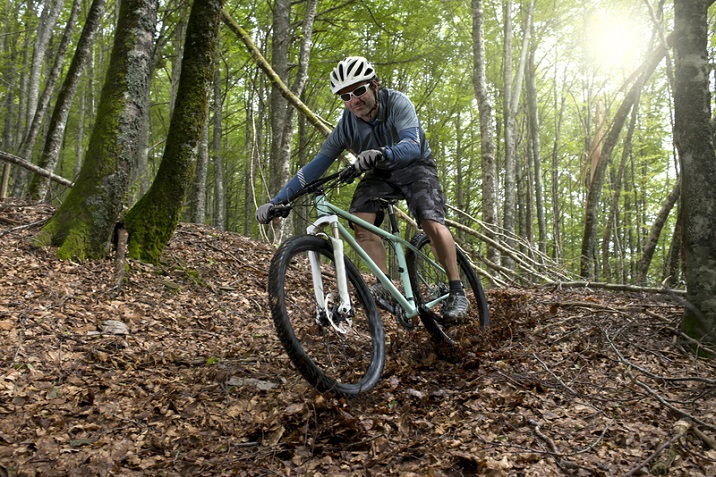
Dirt Jumping Bikes
Dirt jumping bikes have a strongly built frame with 4 to 6 inches front suspension and a rear suspension that can be either between 3 to 4 inches. The bike comes with almost nine gears. They mostly use 24-26 inches fast rolling tires, which is ideal for this terrain and have low seat posts and overly sized handlebars.
Mountain Biking - Equipment
In this chapter, we will discuss about the equipment and accessories used in Mountain Biking. Lets start with helmets which is the most important equipment that every biker must wear.
Helmets
Helmets are mostly use as a protective measure for bikers head. Use of helmet is almost universal in all bikers. Based on their design, three types of helmets are used. These include cross country, rounded skateboarder style, and full face. Cross country helmets are very much similar to road racing helmets. They are lighter and have aerodynamic qualities.
Rounded skate board helmets are simpler and cheaper than other helmets and cover a large area of the head. They are made of hard plastic and can take up to multiple blows. Full faced helmets are used for maximum security with a jaw guard placed in it and are stronger as well as heavier than other helmet types. They are made of carbon fibres and are well ventilated.
Gloves
Unlike normal road touring gloves, biking gloves are specially designed for bike riders safety. They are made of heavier materials with thumb and other fingers are mostly covered because of safety issues. The gloves have padding near the hand knuckles.
Glasses
The glasses used by mountain bikers are very much similar to that of other racing sports. They are mainly used to avoid debris on the trails. Filtered and colored lenses protect eyes from strain. Downhill and free ride bikers mostly use goggles that are used in motor cross or snowboard sports.
Shoes
Shoes used by the bikers have gripping soles with more flexibility similar to hiking boots.
Hydration Systems
As bikers often ride through off road terrains, hydration systems are very much important for them. They use water bottles as well as water backs with tubes in their lightweight backpacks.
GPS Navigation Device
GPS navigation devices are provided in handlebars and are used as a navigation map and to monitor players progress during the race. Mostly premade mapping system or internet downloaded maps are used for this feature.
Pumps
Pumps are used mostly to inflate flat tires.
Bike Tools
Bikers carry bike tools as well as extra tires for avoiding situations like mechanical problem.
Lighting
High-powered LED lights are used, especially for biking at night.
Body Armours and Pads
Different protective pads and guards are used in mountain biking to protect the biker against crashes and accidents. For knees as well as elbows, neoprene sleeves are used; while hard plastic shells are used to protect the limbs as well as whole body.
For spine protection, metal enforced plastic plates with foam padding are used. Some bikers also use chest plates, abdomen protectors.
First Aid Kit
Every biker carries first aid boxes in order to clean and dress cuts that are caused by accidents or crashes. As the speed rises, injuries to head, chest or spine are likely to occur, first aid kit is highly recommended for bikers. In case of severely injured bikers, either motor vehicles or helicopters are used to move them.
Mountain Biking - Trails
Trails play an important role in deciding the type of variant. As all types of mountain sports follow different terrains for their racing, all of them mostly opt for off road terrains. Mountain biking is categorized based on the type of terrains used.
Cross Country Biking − In case of cross country biking, the trails are kept simple with moderate complexity. Mostly rough forest paths and fire roads are used for this type. In case of downhill, steep and rough terrains are used that are in descending or sloppy format. In case of free mountain riding, the terrains are made for free riding and no special trail rules are there for free riding.
Enduro − In case of Enduro, the terrains used are descending as well as full of technical obstacles.
Dirt Jumping − In dirt jumping, custom moulds made of dirt are used on the terrain.
Trail Riding − In trail riding, off road terrains like rail trails, fire roads are used, which have less technical complexities as this biking type is considered as a recreational activity.
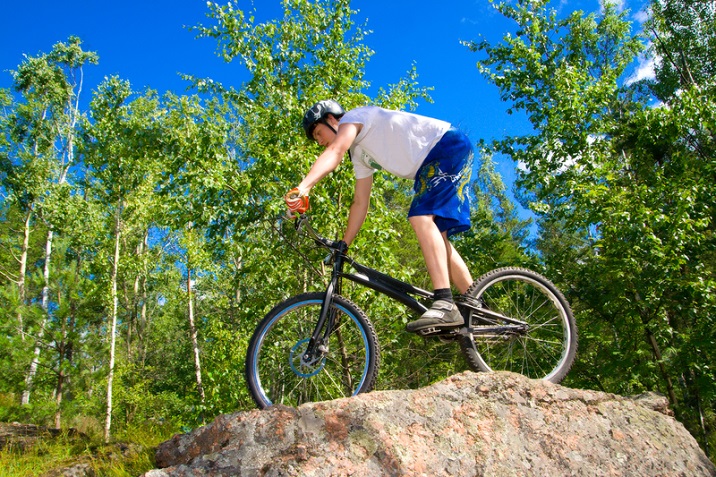
Mountain Biking - Cross Country Biking
Cross Country biking is the most common format of mountain biking and it is the only form of mountain biking listed in the Olympics and being practiced since 1996. Cross country bikes are lightest mountain bikes weighing anywhere between 7 and 16 Kg (15 and 35 lbs).
Tracks can be point-to-point or lap based, though it is not as popular as downhill cycling, it garners highest number of participants. Globally cross country biking is governed by the Union Cycliste Internationale.
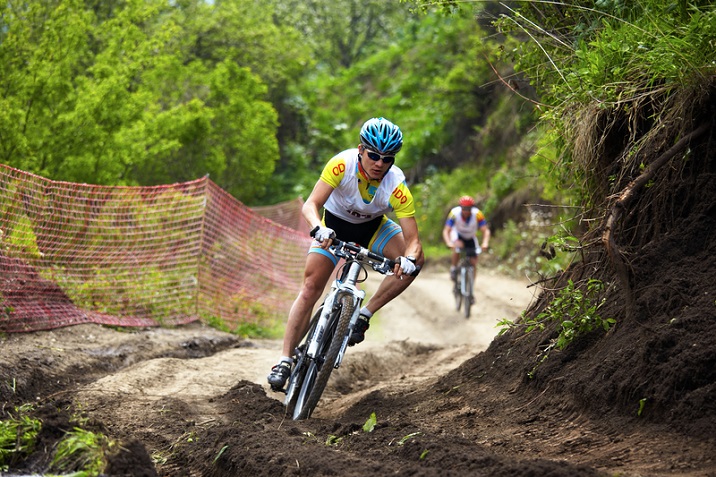
Cross country terrains are mostly rough forest tracks as well as single tracks and smooth fire roads. In case of cross country riding, the technical complexity of the trails used has to be either easy or moderate. The bikes used in XC biking are the lightest bikes typically weighted between 7 to 16 kg and they feature either front or rear suspension.
We have the following three types of Cross Country biking −
Cross-country Eliminator − In this race, the last one person or two persons to go through the finish line are out of the race.
Cross-country Olympic − It is a cross country biking technique followed in Olympics which consists of number of lap racings in a short circuit.
Cross-country Marathon − Here the route is 65 to 100 kms and it is open for everyone.
In case of cross country biking, endurance is given more priority than technical abilities and races may vary from 30 minutes to 4 hours. In case of cross country races, group of people are released for race and the forming of groups is based on their age group or abilities.
Mountain Biking - Downhill Biking
This is the most famous type of mountain biking which involves racing on steep and rough terrain. Here the rider mostly travels through a descending sloppy terrain. Because of the extremely steeply terrains, downhill biking is considered as the most extreme and dangerous biking type and body protecting pads as well as guards are heavily recommended for this biking.
Downhill bikes are heavier and stronger compared to other mountain bikes mostly weighing around 15 to 20 kg and are made of Carbon Fibres with dual suspensions and large disc brakes. Riders have to select their path by compromising either on the shortest route or the fastest route.
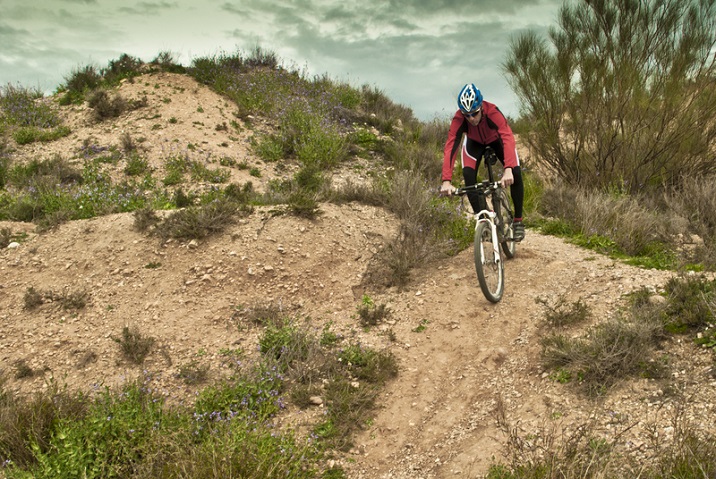
The whole track was defined by tape line and if a rider crosses the tape, they must return to the course at the point of exit. If that rider doesnt gain any time advantage by crossing the tape, he can continue the race. Competition is such fierce in this race that winning margins are often less than a second.
Enduro
In the Enduro format of Mountain Biking, there are both timed downhill section and timed uphill section. The racer who takes the lowest combined time of Downhill and Uphill results to be the winner. This race format can go from 1-2 days to week long competitions.

As per endure World Series 2015 Rule book, minimum of four stages are required per event and at least three different courses must be used. Few places in the world take the word Enduro as a contraction of endurance.
Mountain Biking - Dirt Jumping
Dirt Jumping is a type of bike riding where the riders have to ride bikes over shaped moulds of dirt and soil. Here the rider has to pass obstacles which are made of dirt and during the ride; the rider becomes momentarily airborne. The objective is to land successfully after being airborne.
BMX dirt jumping or free style bikes are used for this kind of bike riding. Once becoming airborne, the players can perform various acrobatic skills in the air. Different types of jumps performed in dirt jumping are −
Double − This is also known as gap jump in which the rider has to take-off and then land successfully.
Tabletops − In this type of jump, the rider has to take-off at one end and land at another end with a flat table on top.
Ski Jumps − In this type of jump, the rider only has to take-off. The landing is on the downhill slope.
Rollers − This jump is similar to tabletop which are performed at the beginning of a trail.
Step ups − In this type of jump, a rider jumps from an incline and lands on a raised platform.
Whoops/Rhythms − In this type of jump, there are three small ramps which are close to each other and a rider has to jump over them.
Spine − In this type of jump, a rider has to take-off and land. There is no gap as in the case of double nor there is a table as in the case of a tabletop.
Berm − This type of jump is performed on sharp turns.
Hip Jumps − In this type of jump, the rider has to turn to 45 degree to 90 degree air while being in air. This angle can be attained either on the left or on the right of the ramp.
The bikes used in dirt jumping have much simpler structure and smaller size comparative to other bike types and have hard tails which helps in performing various skills while being airborne.
Mountain Biking - Free Riding
Free ride is one of the most popular type of mountain biking which is a combination of downhill biking and dirt jumping. It is more focused on different tricks and technical abilities. Free ride bikes are heavier than cross country bikes as it comes with a weight of 13 to 18 kg and dual suspension but have the same climbing capacity.
Modern free ride bikes are very much similar to downhill bikes. Slopestyle riding is a popular free ride mountain biking where the players have to cross multiple lines during a course. Sally players choose lines which let them show their distinct skills to obtain more points from judges.
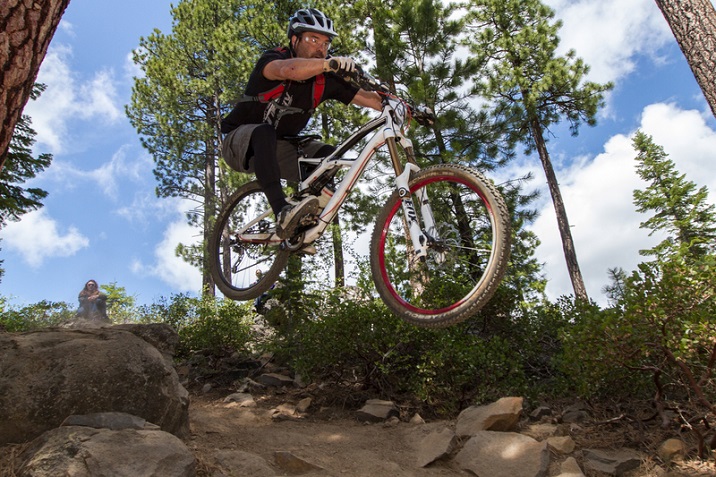
In case of downhill riding, which is more likely descending a slope as quickly as possible, players usually face many obstacles during the race and it involves a lot of jumping, dropping as well as overcoming rocky obstacles.
In case of free ride, players ride in a wider terrain and it involves both descending on slopes as well as jumping on inclined platforms while performing airborne acrobatic skills on jump which is different than downhill riding. British Columbia's North Shore is one of the most recognized starting point for free ride biking.
Mountain Biking - Trail Riding
Trail riding is a type of mountain riding where the rider rides his bike on off-roads on recognized and way marked trails, forest paths or horse riding paths. It is often considered as a recreational mountain biking sport. Trail riding can be of any length starting from some hours to long distanced multi day trips.
It can be an individual biking trip or a group biking trip or a larger event biking trip organized by a club. In some areas, rail trails are redeveloped on former railway lines to be used as biking terrains for trail riders.
Trail riding can be defined as a pleasure riding which encompasses many forms of bike riding for personal enjoyment and as a recreational activity without any rules or competition elements. Mountain trail rides are mostly done on mountain trails, fire roads and other unpaved dirt trails which involves rocks, steep slopes and loose sands and gravel.
Trail riding bikes have larger knobby tires with more powerful brakes and lower gear ratio. It can be a short, steep trail or a longer trail on forest trails and railway trail paths or a hiking trail which is done on mountain trails and lasts for days.
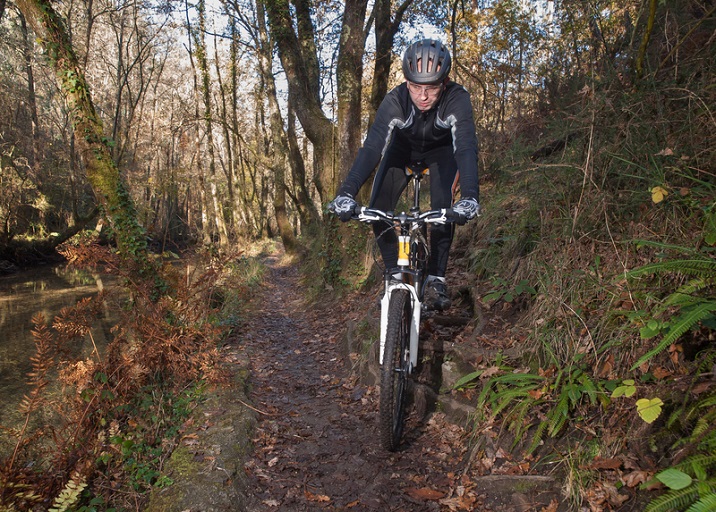
Trail riding is more of an enjoyable adventurous activity than a sport. It also involves other activities like camping, backpacking, hunting fishing etc. Because of controversies surrounding biking on trails regarding environmental issues and security of the bikers, mostly bikers are restricted from narrow, single track trails. However, biking is allowed on fire roads.
Mountain Biking - Rules
The International Mountain Bike Association has developed a set of rules for mountain biking to be followed in most of the events. The riders need to follow these set of rules in order to have a safe and enjoyable riding experience. Some of those rules are as follows −
While finding out an injured biker on the trail, the rider should find a court marshal and inform about the injured rider.
Every player must register to the race before taking part in it. After registering to the race, every player will be provided with a number plate which has to be displayed by each player. In no way that plate can be cut or folded or mutilated and no stickers are allowed on the number plates.
Competitors must wear proper riding attire, i.e., a shirt, short and fully enclosed shoes.
The rider must know about the maintenance of a bike and all repairs must be performed by individual racers as no riders will be provided any off root repairing facilities.
If the rider somehow returns back to the staging area, he may be provided spare bikes or parts by the organizers and again will be allowed to re-enter in the competition.
The rider must follow the correct route for the race as deviation from the route may result in disqualification of the player from the race unless he re-enters in to the race from the point of exit.
Feed zones will be available throughout the race course for players who feel thirsty or hungry during a race but interfering with other players during feeding or hands-up may result in disqualification of the player.
No rider should throw food packets, wrappers or other wastes on the trail.
Any uproar behaviour or throwing tantrums during the race may lead to disqualification of the player.
Any kind of profanity or immoral behaviour towards other competitors or race workers may lead to disqualification of the player.
MP3 or other musical instruments are allowed but they must not interfere with a riders awareness of other racers as well as the race course.
In case of overtaking any other rider, the rider must not disturb the riding progress of others.
Mountain Biking Risks
Mountain biking is a thrilling action sport which is popular worldwide because of its adventure-filled race events. Mountain biking is adventurous and it involves great risks.
In some cases serious and long term accidents and spinal injuries have been reported which have even pushed players into paralysis. Sometimes mountain bikers even fall from great heights where even the helmet is not strong enough to save them from head and neck injuries.
In some cases, wrist and facial fractures have also been reported. In case of more extreme biking like downhill biking, players may face severe injuries due to imbalance or accidents. Riders should choose trails in which they are more comfortable, in order to reduce the risks.
Mountain Biking - Champions
The International Mountain Bicycling Association (IMBA) is a non-profit organization and the governing body of mountain biking sport worldwide. It was formed in 1988 by five California based mountain biking clubs, who formed an alliance in order to fight widespread trail closures.
In 2006, IMBA grew to 32000 members with more than 600 affiliated clubs. Presently more than 35000 members are there in IMBA from approximately 30 countries around the world.
UCI Mountain Bike World Cup is a multi-round bike race series that is sanctioned by the Union Cycliste Internationale. The first world cup was held in 1989, where only cross country biking was included. After two years, downhill world cup was inaugurated. Riders are declared winners based on their placing in each event.
UCI also organizes UCI Mountain Bike & Trials World Championships which is also a mountain biking championship for all kinds of mountain biking types.
Let us now discuss briefly about some of the champions of Mountain Biking and their career highlights.
Hans Rey
Hans Rey is one of the pioneers in free riding as well extreme mountain biking, Hans Rey is from Emmendingen, Germany.
In his career, he has won the UCI world champion title record three times and 15 other national titles.
In 1999, he was inducted in the mountain bike hall of fame. Through his charity, he has provided more than 7000 bicycles in more than 25 developing countries around the world.
John Tomac
John Tomac is regarded as one of the true allrounder of all time in mountain biking, John Tomac is from Michigan, United States.
In a career that spanned more than 20 years, he has competed in various disciplines in road racing and mountain biking.
He was famous for his incredible bike riding skills and outstanding control in downhill biking. In 1991, he was inducted in the mountain bike hall of fame.
Julien Absalon
Julien Absalon is a mountain biker from France who has won many medals in his career.
He has won two gold medals in Olympics one in 2004 and the other in 2008. In World Championships, he won five golds, two silvers, and two bronzes.
He has won seven golds, two silvers, and two bronzes in World Cup. Along with these, he also participated in European Championships and won five golds and four silvers.